Santa Clara University
Santa Clara University (SCU) is a small Jesuit university located in Silicon Valley, and the oldest continuously operating university in California. At the heart of this beautiful, quintessentially Californian campus is the Spanish Mission Santa Clara de Asís, dating from 1777, with the current structure built in 1818. The undergraduate student body is approximately half Catholic. Although rooted in Jesuit tradition and hosting an active Jesuit community, the university advertises itself as religiously tolerant and open to non-Catholic students and religious observance, and to non-religious students. The university maintains and provides to all faculty and campus organizations a religious calendar of non-Catholic holidays so that accommodations can be made and inclusivity practiced.
SCU is known academically for its Leavey School of Business, which awards nearly a third of all undergraduate degrees each year in a range of business subjects, from accounting to management information systems. Its School of Engineering is also well-regarded and awards the second-highest number of undergraduate degrees each year. The campus is particularly attractive to students who want to pursue careers in tech, as a result of its strong business and engineering programs and very close proximity to several of the world’s largest and most successful tech companies, from Apple and Facebook to Salesforce and Oracle.
Highlights
Internships
Business
Engineering
Campus Ministries
Lowlights
Cost
Support
Diversity
Sports
Contents
- Students who thrive
- Students who may have challenges
- Successful applicants
- How the application process handles majors
- Academics
- Academic support
- Support for disabilities & learning differences
- Financials
- Housing & transportation
- Social life & recreation
- Athletics & campus spirit
- Health
- Graduation requirements
Quick Info
Students who thrive
As a Jesuit university, Santa Clara is invested in the spiritual and religious lives of its Catholic students, offering campus ministries, leadership and scholarship opportunities, and other community building programming. The historical and cultural heart of Santa Clara University’s campus is a 200-year-old Mission church, originally dating to the Spanish religious colonization of Northern California in 1777. The Mission church is a unique feature among Catholic universities and provides a historical religious and spiritual home for the campus’s Catholic faculty, staff and students. Although the campus is officially welcoming to students from all faiths or no faith, and maintains an Interfaith Council, the large proportion of Catholic students, staff and faculty ensures that Catholic students in particular will be able to find community and religious growth opportunities in abundance.
The university is also heavily invested in its Business and Engineering schools, with nearly half of its degrees awarded annually from these two campus divisions. Business and Engineering students have access to interesting, unique degree programs and other academic opportunities through these schools, including Marketing, Management Information Systems, and Individual Studies (among others) at Leavey School of Business, and Bioengineering, Civil, Environmental & Sustainable Engineering, and Web Design & Engineering (among others) at the School of Engineering. And, because of its central location in Silicon Valley, SCU students have access to numerous career development opportunities at world-class tech firms just up the road. SCU may also be a good choice for students interested in taking a gap year, as the campus allows students to defer enrollment to pursue enriching non-academic experiences.
Other students who will thrive at SCU include those who are looking for an alternative to California’s large public universities. They are seeking a more intimate campus in a suburban community in Northern California that is still close to a vast metropolis. Class sizes are smaller, which bring closer relationships with professors, while still being in an ideal location to find internships. With its somewhat homogeneous population and religious affiliation, SCU provides an active social life for many students who want a more cohesive campus community than would be found in a large public university or dense urban setting.
Reliable rail service allows students to travel up the peninsula to San Francisco within an hour, but for the most part students will spend their time on or near their small campus in leafy, quiet, Santa Clara. Although San Francisco is known for dense fog and chilly summers, Santa Clara and the South Bay are very different, with about 300 days of sun each year and warm weather nearly year-round.
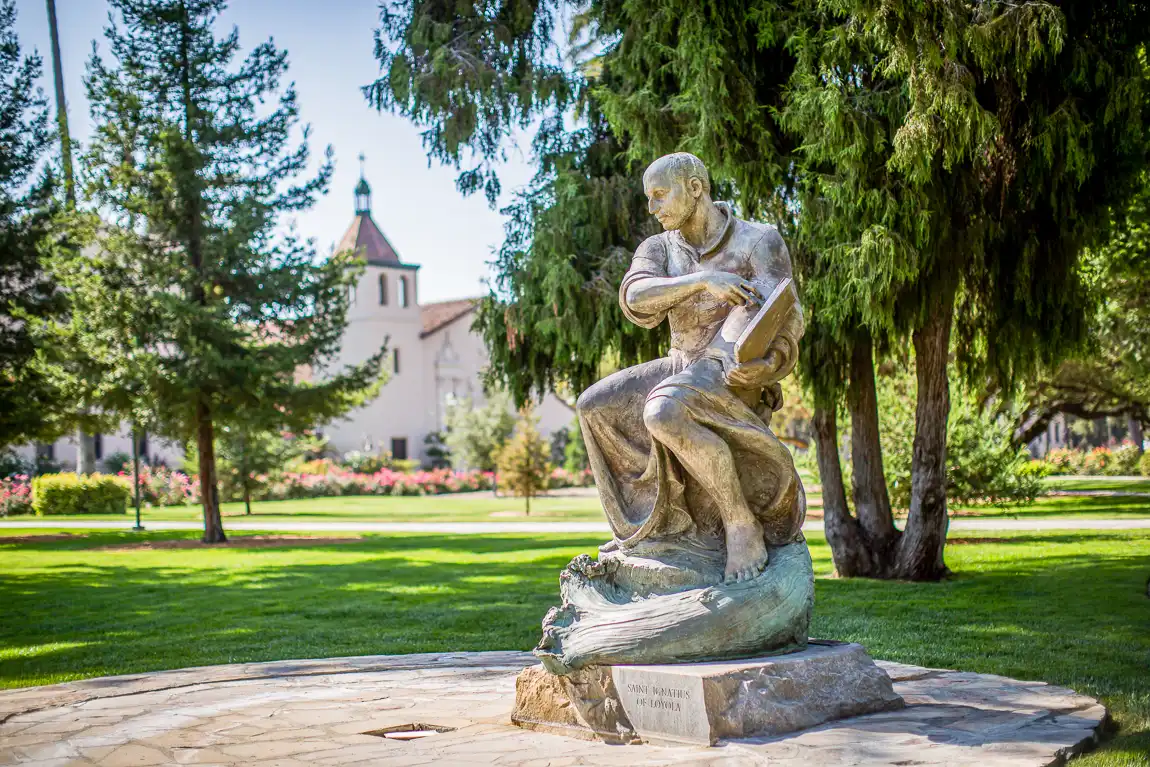
Students who may have challenges
Santa Clara is one of the wealthiest communities in one of the wealthiest regions in the world. The New York Times Upshot data analytics team has ranked Santa Clara University as #7 nationally among private universities for the family wealth and socioeconomic status of its student body, which could impact the social experience of less affluent students. In addition, the campus has been ranked by CollegeFactual as “below average” in terms of ethnic and racial diversity, with a disproportionately high white student population and disproportionately low numbers of students of color. Although students from lower-income and ethnically or racially marginalized backgrounds will have opportunities to make friends, find community, and fit in here—especially if they are Catholic—the campus may feel less diverse than the many communities its largely Californian population will be coming from.
Given that SCU was developed on Indigenous ancestral lands that later became part of the Franciscan Mission system, SCU scholars who have studied the campus’s origins encourage campus leaders to do more to recognize the legacy of the Ohlone and Muwkewa Ohlone people. While SCU has made strides in diversifying the student body, the campus’ enrollment of Indigenous students is low relative to other Bay Area and Northern California universities, and the SCU website does not list any designated scholarship programs for Indigenous students.
In addition, while SCU has become substantially more welcoming and inclusive of the LGBTQ+ community over the past 30 years, SCU students and staff continue to speak out about the challenges of creating an inclusive campus environment for queer and trans students in the face of vocal Catholic conservatism from the campus’s Jesuit community, including alumni. And as a Catholic campus, pro-choice students may also find it hard for their views to gain traction on campus. In general, the SCU student body leans to the right politically.
Students with significant disabilities or learning differences may wish to seek out alternative educational opportunities, because Santa Clara only offers basic accommodations and services, while also requiring fairly extensive documentation for disabilities that require accommodation. The K&W Guide ranks SCU at the level of “Services”, its lowest category and one which reflects minimum compliance with the ADA.
Students who are looking for a big-campus experience may not be as excited about SCU as they would be for larger universities. Although Santa Clara has a large sports program, including Division I teams in the WCC, the small student body and lack of participation in a more prominent athletic conference reduces its overall impact on campus social life.
Successful applicants
First-Years
SCU is a selective university, with a typical admission rate of about 55%. Most students who are admitted here score over 1300 on the SAT composite and over 30 on the ACT composite, with an average unweighted GPA of 3.67. SCU also evaluates class rank as part of its admissions process; 72% of its admits are ranked in the top quarter of their high school graduating class.
The minimum high school course requirements are: 4 years of English; 3 years of history or social science; 3 years of math, with 4 recommended; 2 years of lab science, with 3 recommended; 2 years of foreign language, with 4 preferred; and a recommended, but not required, 1 year of visual or performing arts.
Santa Clara adopted test-optional admissions during the pandemic, and is currently in the process of evaluating whether to retain the policy for future admission years. It is not yet clear if students applying to enroll in 2024 will be required to submit test scores. As a result, for students who are interested in attending SCU, Capstone recommends preparing for and taking the SAT or ACT.
SCU allows a limited number of enrollment deferrals for students who want to take a gap year. Admitted students who have paid enrollment deposits may submit a Gap Quarter or Gap Year application in order to participate in an enriching, non-traditional opportunity prior to matriculating. A $500 deposit is required along with the application, and not all applications are accepted. SCU discourages gap quarters or years in which the student will be participating in a program for college credit. Students who apply Early Decision or Winter Start and commit to attending will not be considered for a gap quarter or year that extends past the start date given in the admissions application.
Transfers
In Fall 2021, Santa Clara admitted 67% of transfer applicants, though this number is subject to change year-to-year. Transfer students may enroll in either the Fall or Winter quarters. A minimum of 8 semester or 12 quarter units of college-level coursework is required before students are eligible to apply as a transfer student. Below that threshold, students must apply as first-years. Applications for gap quarters and years are also accepted from interested transfer students according to the same criteria as first-years, given above.
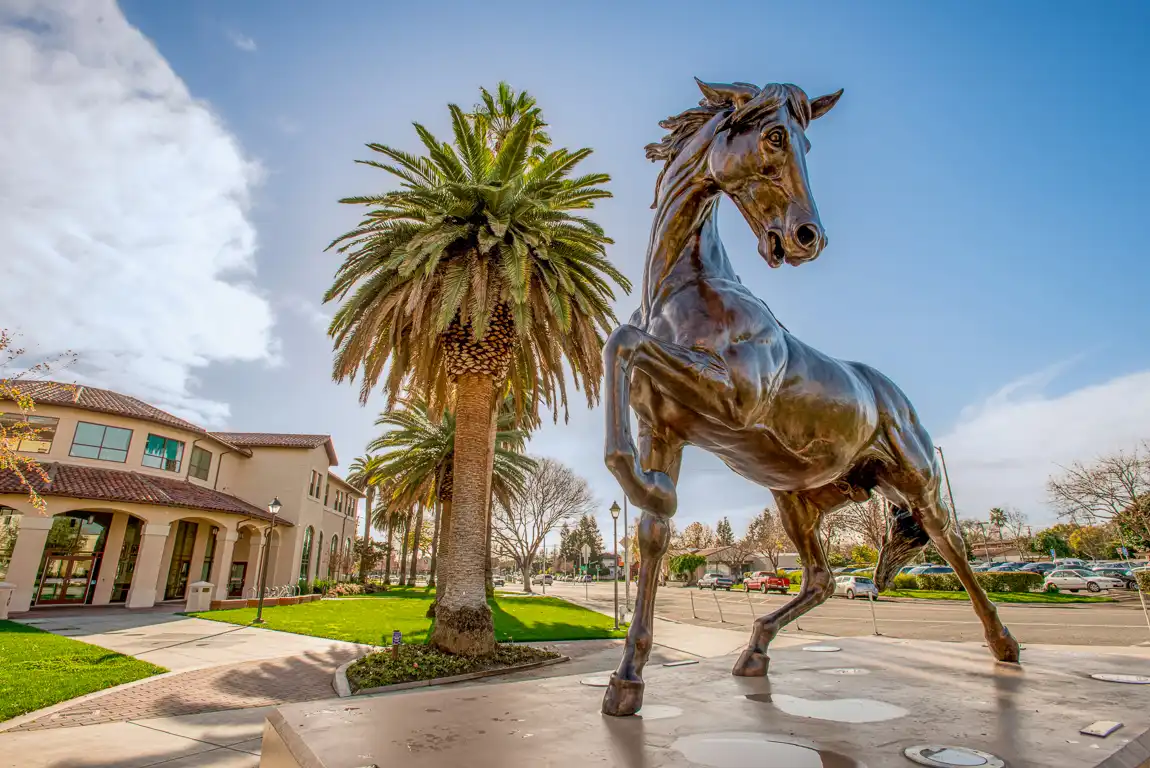
How the application process handles majors
Santa Clara requires all applicants to apply into one of the university’s three colleges as part of the Common Application: College of Arts & Sciences, Leavey School of Business, and School of Engineering. Declaring a major at the time of applying is not required, but students are allowed to.
Academics
Santa Clara University comprises three colleges: the College of Arts & Sciences (CAS), Leavey School of Business, and the School of Engineering. SCU’s business and engineering programs are strong and popular: nearly a third of undergraduate degrees awarded are in Business or Marketing through Leavey, while another 15% are in Engineering. SCU also does engineering outreach, offering a competitive, free summer program for high school sophomores interested in engineering, called Summer Engineering Seminar, and they now offer a second-year program for high school juniors who previously participated in SES.
In CAS, Social Sciences and Communication are the most popular fields and round out the top four fields for the university as a whole. The Communication Department’s programs are well-regarded nationally and offer specialized practical and theoretical training in fields such as journalism, entertainment, tech, and graduate programs. Communications students also have access to and are encouraged to participate in some of the numerous co-curricular opportunities available.
Altogether, SCU offers more than 50 majors, minors, and special programs in fields ranging from Child Studies and Individual Studies to Engineering Physics, Web Design & Engineering, and Management & Entrepreneurship. For aspiring future teachers, a common track is to complete a BA in Child Studies, followed by a combined MA in Teaching and teaching credential through SCU’s teaching certification program. The Public Health Science major is also very popular and can be great preparation for aspiring medical students and public health professionals.
SCU is proud of its selection of graduate-level research opportunities available to undergrads, and the range of internships its students complete each year.
The top approximately 5% of each SCU class is offered a place in the University Honors Program as part of the undergraduate admissions process—though a secondary application is required for interested students—or through a first-year spring application for other qualified students. Transfer students may be admitted on a case-by-case basis. The honors program offers small, focused class sizes, priority academic registration, a senior thesis program, a place in one of the four honors Residential Learning Communities (RLCs) in the residence halls, unique scholarship and fellowship opportunities, and overloading (taking more course units in a quarter than is typically allowed). Some SCU courses are reserved specially for honors students to help foster community within the program. Honors students are required to complete additional course requirements in addition to and beyond the graduation requirements that all undergrads must complete.
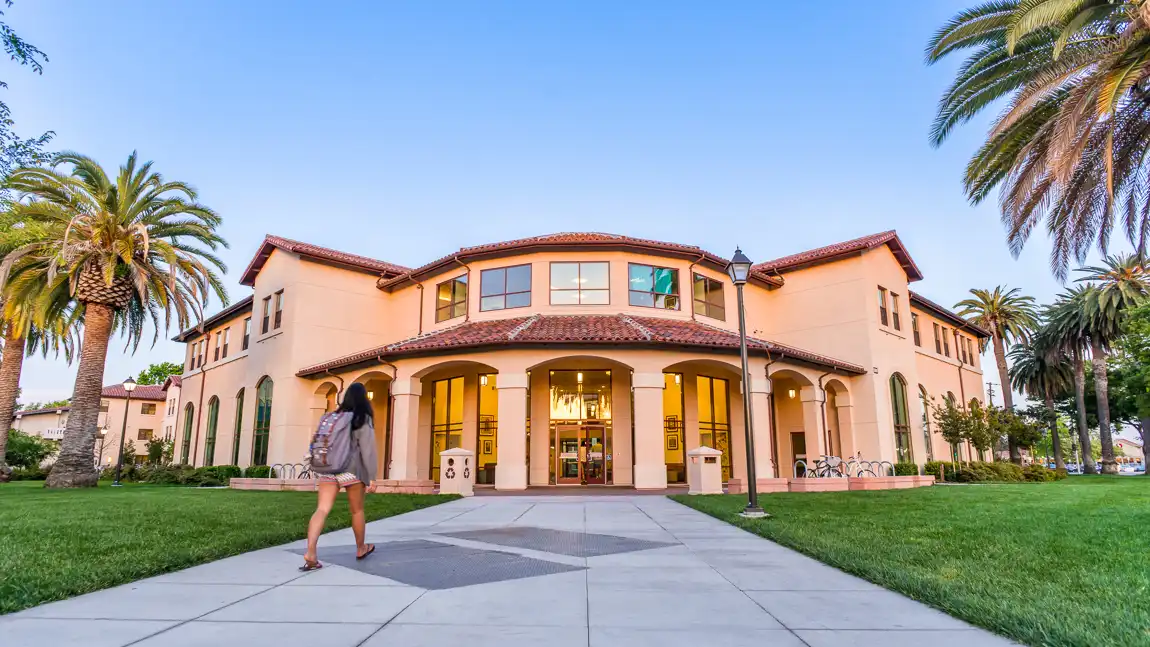
Academic support
Santa Clara students have access to a few different options for tutoring, academic advising, and study support: Drahmann Advising & Learning Resources Center, the main hub for academic support; the Math Learning Center; the HUB Writing Center; and Tau Beta Pi tutoring for Engineering students.
The Drahmann Center offers undergraduate academic advising in course registration, major and minor course planning and Core Curriculum. It also acts as a centralized location for academic advising for the College of Arts & Sciences, the Leavey School of Business, and the School of Engineering. Academic support in collaboration with faculty advisors provides department-specific support to students with declared majors. The Center offers tutoring for numerous specific courses, as well as peer tutoring in Accounting. For courses not included on the tutoring list, students may be able to find tutoring services at the Math Learning Center, HUB Writing Center, or Tau Beta Pi.
The Math Learning Center provides space and resources for student-led study groups, individual appointments with tutors, drop-in tutoring, and single-session skill-focused appointments called power ups.
Students who need help with writing skills or assignments can sign up for 30, 45, or 60 minute appointments at the HUB Writing Center. Appointments are offered in person, remote in real time, and online asynchronously, depending on the student’s needs.
Tau Beta Pi is the national engineering honors society, and at Santa Clara University it offers hybrid peer tutoring every quarter. Currently-enrolled students on campus have access to the list of tutoring options and a sign up form.
Support for learning differences
Santa Clara’s disability support services are fairly typical for universities its size, but not exceptional or expansive. Students have access to testing accommodations, notetakers, interpreters, assistive technologies, family-provided support animals, and alternate format books, as well as some housing and dining accommodations. Unfortunately, the accommodations and services offered do not extend much beyond this baseline. For example, SCU does not advertise academic coaching or disability-specific tutoring services—students who require tutoring are advised to seek it at the Drahmann Center, which serves the whole student body. SCU in some, but not all, cases will make referrals to community providers for students who need to be assessed for disability documentation.
Students are also required to document disabilities before accessing accommodations and services through the Office of Accessible Education (OAE). These documentation requirements are more extensive than at some other universities, including by requiring private evaluation for several disabling conditions. The Office has a relatively small staff of about twenty, including student workers who assist the office manager. Primary advising for all students is handled by just 2-3 directors and coordinators.
Santa Clara may be a very good fit for some students with disabilities or learning differences, particularly those whose circumstances are less debilitating, but determining so will require careful consideration on the part of families and students. Be sure to contact the OAE by phone (408-554-4109) or email (oae@scu.edu) to inquire about the specific services or accommodations you will need to ensure that they will be offered at the level you require.
If you have any questions about how to evaluate schools for disability and learning difference support, or want help building a college list and navigating college admissions with these needs in mind, please reach out to Capstone for a free consultation. Carolyn Weirick and our other expert counselors are ready to answer all of your questions and help you find a path to a fulfilling college experience.

Financials
Merit awards are limited and largely available only to first-year applicants who maintain good academic standing throughout their four years (to qualify for annual scholarship renewal) and choose not to take a gap year. That means that continuing and transfer students are generally not eligible to apply for merit awards. All students are, however, eligible for academic awards from the university and from their major departments.
Applicants who are eligible for merit awards do not need to fill out a separate application; admissions officers consider applicants for scholarships based on their admissions applications. There are five merit scholarships, the most generous of which covers the entire cost of an SCU education, including tuition, room, board, books, and supplies, for 12 quarters. Other awards cover the full or partial cost of tuition for up to 12 quarters.
Transfer students are eligible for the SCU Transfer Scholarship, a University Grant considered and awarded separately from the pool of merit scholarships. Other grants provide aid for students who attended and graduated from a Jesuit high school, who are legacy students at SCU, or who have particular financial need and strong academic qualifications. The Hurtado Scholarship, offered by SCU’s Jesuit Community, provides aid for undocumented students and covers the full cost of a 4-year undergraduate education. Transfer students may apply for the Hurtado Scholarship, but must apply for admission in the fall quarter only. First year students are eligible for it in any application track (EA, ED, or RD).
Housing & transportation
All first-year students, and about half of all undergraduates, live on campus at SCU. On-campus housing primarily takes the form of Residential Learning Communities (RLCs), which all first-years are required to live in, though additional options for continuing students are available, including double and single room dorms, apartments, and full house rentals.
RLCs are paired with a single dorm each, and are organized around a set of guiding principles or themes. There are nine total. Some examples include:
Alpha RLC, in the mini-suite style Graham Residence Hall, for first and second years, organized around the themes of innovation, integrity, and impact.
da Vinci RLC, in Casa Italiana Residence Hall, intended to promote and celebrate Italian culture and heritage, science, engineering and the arts.
Loyola RLC, in the four-year, suite and apartment style Sobrato Hall, structured around themes of faith and social justice in the Jesuit tradition.
Queer and trans students can receive housing accommodations by contacting the housing office by email (housing@scu.edu) or phone (408-554-4900). Students with disabilities who require housing accommodations can receive them through the Office of Accessible Education with documentation of a housing-implicated disability.
Finding affordable off-campus housing can be very challenging for continuing students, because Santa Clara lies at the heart of one of the most expensive housing markets in the world. Unfortunately, SCU does not offer four years of on-campus housing for all students, so families with any concerns about housing access or affordability may want to look into other options.
Transit
Santa Clara University is adjacent to Santa Clara Station, serviced by Amtrak and Caltrain. On Amtrak, students can travel up the East Bay to Oakland, and on to Sacramento and the Central Valley cities. Caltrain serves the Peninsula, passing through Mountain View and Palo Alto on its way to San Francisco. Students can also access San Jose’s VTA transit system by taking Caltrain one stop south to San Jose Diridon Station, the central train station for San Jose.
For trips to Santa Cruz, just south over the mountains from Santa Clara, students can take the reliable and fast Highway 17 bus service.
Most students will never need a car while studying at Santa Clara University. Electric scooters, rideshare options, public transit, and accessible bike lanes make it easy for students to get around in other ways. Cars are essentially required for longer trips outside of the Bay Area, however, and may be preferable for students who plan to commute to campus.

Santa Clara offers a broad range of activities and organizations for its students to participate in, including performing and theatre arts, recreational sports, academic- and major-related internships and research opportunities, and a diverse list of student groups. For a look at the range of events offered, check out SCU’s Campus Calendar and Performing Arts calendar.
Prospective students should be aware that although the university does not officially recognize any Greek chapters, there are several unrecognized fraternities and sororities off-campus. Approximately 25% of undergrads pledge Greek organizations each year. Unaffiliated Greek houses do not have an official relationship with the university administration, which can lead to underregulation and more dangerous social environments in those houses, as the only regulating oversight comes from each house’s national chapter. Hazing may be more common in unaffiliated Greek systems.
Because of its suburban location, SCU may offer less exciting nightlife than some other colleges. Students give mixed reviews on the range of social options available to students, commenting on the lower-key nature of social life but visible presence of frat parties for those who are interested.
As a Catholic and Jesuit university, SCU offers Campus Ministries programs for the spiritual and religious development of its Catholic students. These include weekly masses at Mission Church, the spiritual center of campus, a prayer week for Christian unity, immersion programs abroad, anti-abortion clubs, and more. The university also promotes religious diversity and tolerance through its Interfaith Council and official support for spiritual and religious clubs for non-Catholic students. Approximately 50% of SCU students are Catholic, and 50% are of other religions, Christian denominations, and non-religious worldviews. The university also publishes an interfaith religious calendar to promote awareness and accommodation of the religious traditions of non-Catholic and non-Christian students in the campus community.
SCU offers Army ROTC on campus, Navy ROTC at UC Berkeley, and Air Force ROTC at San Jose State University.
Athletics
Despite being a smaller university, SCU offers lots of sports opportunities for students. With 20 NCAA Division I teams, including most major sports except football, students can take part in sports-oriented campus spirit events throughout the year, and watch fellow Broncos compete against other teams in the WCC. Santa Clara also offers 17 nationally-competitive club sports for student-athletes who want to continue athletic careers alongside an academic focus. Intramural sports are very popular, with over 3,800 students participating each year.
Bellomy Field is open to students for intramural sports and casual use, while the Malley Fitness Center offers indoor intramurals and other recreational sports, weightlifting, and fitness classes.
Health
Santa Clara students can receive basic healthcare services at the Cowell Center on campus. For specialist services or more complex needs, students are referred out to community providers. All Santa Clara students are required to carry health insurance, either the Student Health Insurance Plan offered by the university or a private plan of equivalent coverage.
Student Health Services at the Cowell Center offers primary care, urgent care, some minor procedures, physical exams, immunizations, STI testing, nutrition services, and health education.
Mental healthcare is provided through Counseling & Psychological Services (CAPS) at the Cowell Center. Services are relatively limited: students have access to short-term therapy, walk-in therapy, crisis support, groups and workshops, and case management, but long-term therapy and all psychiatry services are referred out to community providers. CAPS also offers a service called CAPS 24/7, a crisis support hotline that students can also use to access referral support and options for individual therapy.
Santa Clara University’s location in the heart of Silicon Valley ensures that students have options for high-quality off-campus healthcare both for physical and psychological or psychiatric conditions. The San Francisco Bay Area is home to numerous academic, research, community, and regional healthcare providers. Students with complex or rare health conditions are likely to be able to find healthcare support in the community while enrolled here. Popular private healthcare systems include Kaiser Permanente, Sutter Health, Stanford Health, and, in San Francisco, UCSF.

Graduation requirements
To graduate from SCU, students must complete all of the following requirements:
- The minimum number of quarter units as determined by degree program
- A minimum of 60 quarter units of upper-division courses
- A minimum GPA 2.0 for all SCU courses and for all major and minor courses
- A minimum of 45 quarter units completed at SCU after achieving junior standing
- All Core Curriculum requirements in place at the time of enrollment
- All requirements for declared major(s) and any minors, including college or school requirements
- Submission of Candidacy Petition for bachelor’s degree at the end of the degree program
Students with final GPAs in the following ranges will graduate with honors:
- 3.50 - 3.699: with honors or cum laude
- 3.70 - 3.899: with high honors or magna cum laude
- 3.90+: with highest honors or summa cum laude
The University Honors Program (UHP) has additional course and grade requirements.
SCU’s College of Arts and Science also maintains a chapter of the Phi Beta Kappa Society, the nation’s most prestigious honor society for undergraduate students in the liberal arts and sciences.
FACT CHECK & INFORMATION SUBMISSION
If you think we've made an error, or want to contribute new information to the article, please reach out to us at info@capstoneadvisers.com to submit your change or addition. Sources for new information are appreciated but not required. If we can verify your reported error or addition, an update will be made as soon as possible.


Santa Clara, California
Est. 1851
Motto: Ad Majorem Dei Gloriam
(For the greater glory of God)
Broncos
Mascot: Bucky Bronco
NCAA Division I WCC
Jesuit research university
Quarter system
55% admission rate
5,900 undergraduates
3,000 graduate students
585 full-time faculty
11:1 student-faculty ratio
77% of classes under 30 students
106 acre campus size
Suburban setting
Mediterranean climate with hot summers, mild winters, and mostly sunny days
First-Year Admissions Evaluation
Evaluates
Course rigor
High school GPA
Application essay
Class rank
Letter of recommendation
Extracurricular activities
Talent or ability
Character or personal qualities
First-generation status
Race or ethnicity
Volunteer experience
Demonstrated interest
Legacy status
Geographical residence
California residency
Catholic religious affiliation
Work experience
SAT/ACT scores (currently optional)
Does not evaluate
Interview
Transfer Admissions Evaluation
Requires
High school transcript
College transcript(s)
Essay or personal statement
May require
Statement of good standing from prior college
Does not require
Interview
SAT/ACT scores
First-Year
Application Deadline
November 1
Early Decision I
Early Action
January 7
Early Decision II
Regular Decision
October 1
Winter Admission deadline
Transfer
Application Deadline
January 7 – April 15
Fall Admission (rolling)
October 1
Winter Admission deadline
Finances
$80,000 / year
Total cost
Tuition
$57,000 / year
Housing & Meal Plan
$18,000 / year
Additional Costs
~ $5,000 / year
Student Health Insurance Plan
Additional $2,800 / year if not waived
Financial Aid
77%
Percent of financial need met (average)
$16,300 / year
Amount of merit aid awarded to students without financial need (average)
57%
Percent of undergraduates without financial need receiving merit aid
Notable Majors & Programs
College of Arts & Sciences
Child Studies
Military Science
Public Health Science
Leavey School of Business
Accounting & Information Systems (AIS)
Information Systems & Analytics
Management & Entrepreneurship
School of Engineering
Bioengineering (3 BS tracks & BS/MS)
Civil, Environmental & Sustainable Engineering
Engineering Physics
Computer Science & Engineering
Web Design & Engineering
This list of majors is not exhaustive
Equity & Inclusion
Transfer Support
- Transfer housing guaranteed: No
- Separate transfer housing: No
- Transfer scholarships: Yes, with limitations
- Transfer admission rate: 67%
- Transfer matriculation rate: 25%
- Does not accept ACE, CLEP, DSST
Disability Support
- K&W Category: Services (lowest tier)
- Basic services & accommodations
- Limited disability support staff
Racial Equity
- Office for Multicultural Learning
- Office for Diversity & Inclusion
- Multicultural Welcome Reception
- “Below Average” diversity (College Factual)
- Black, Indigenous students underrepresented
- Indigenous enrollment decline over time
- Lack of atonement for mission system
- No specific Indigenous student scholarships
LGBTQ+ Equity
- Rainbow Resource Center
- Multicultural Welcome Reception
- Lavender Graduation ceremonies
- Housing accommodations available
- All-gender restrooms available
- All-gender on-campus housing
- Nondiscrimination policy includes sexual orientation and gender identity & expression
- Inclusion leaders continue to see need for improvement
Other Equity
- LEAD Scholars Program for first-generation students
- Undocumented Student Support, including scholarships
- Yellow Ribbon Program
- Ahmanson Veteran Scholarship Initiative
- Student body among the wealthiest in the US
- Meets less than 80% of demonstrated need
After Graduating
Career Center supports undergrads, alumni, and some grad students
Top: Mission Santa Clara de Asís at Santa Clara University
Bottom: Quad and Mission Santa Clara de Asís at Santa Clara University
All images courtesy of SCU

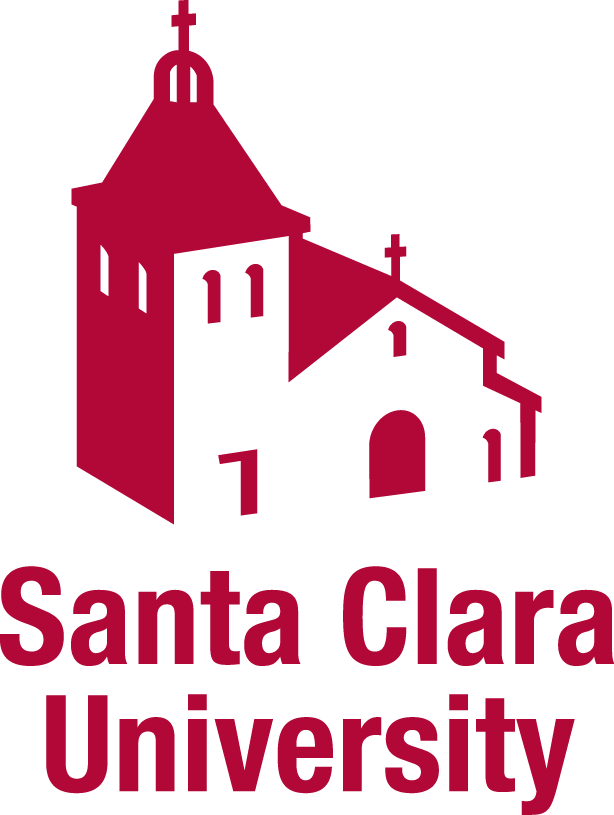

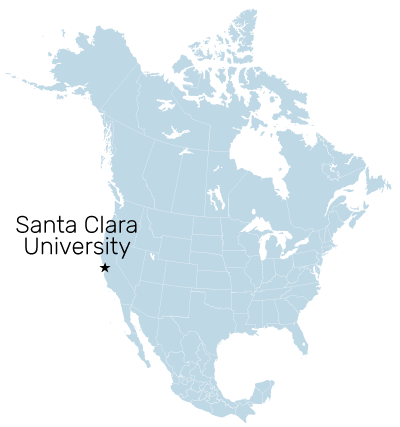
![scu_map2 Santa Clara University [location in North America]](https://capstoneadvisers.com/wp-content/uploads/2023/07/scu_map2.png)
Social life, recreation & campus spirit